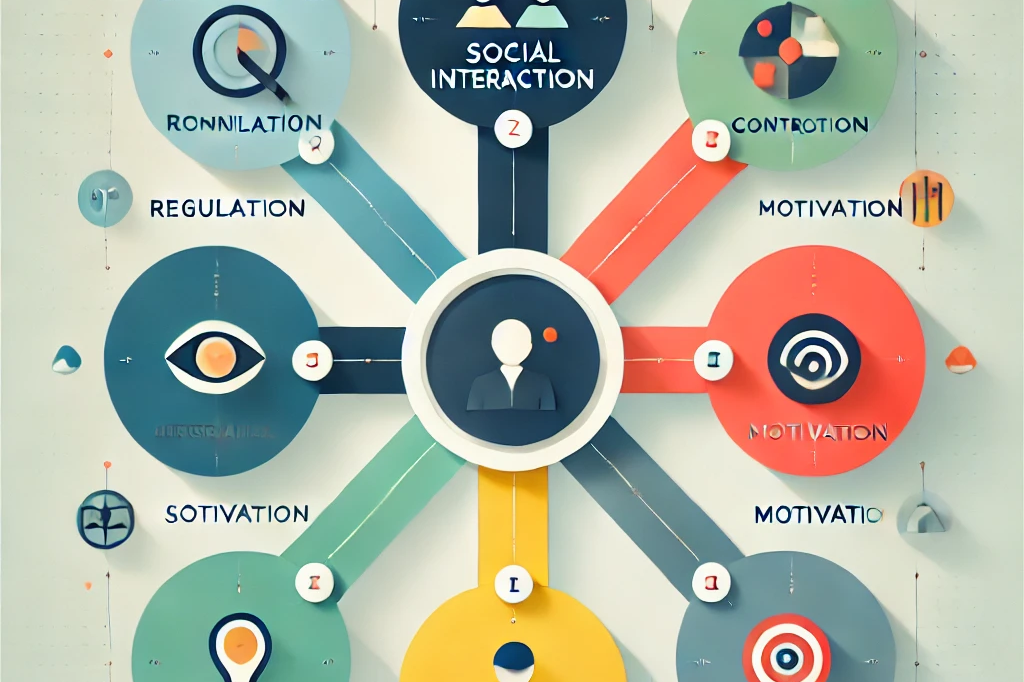by Venchito Tampon | Last Updated on October 31, 2024
Intrapersonal communication refers to the dialogue that takes place within an individual. It is the process of understanding and managing thoughts, feelings, and internal messages.
Unlike interpersonal communication, which involves interaction between two or more people, intrapersonal communication is an internal process that influences how individuals perceive and react to the world around them.
Intrapersonal communication encompasses various components, such as self-talk, self-reflection, and imagination. It plays a critical role in shaping one’s self-concept, beliefs, and decision-making processes.
Effective intrapersonal communication can improve business communication, and enhance self-awareness, emotional intelligence, and overall mental well-being.
Actionable Tips to Practice Intrapersonal Communication
Individuals can adopt various strategies and practices to leverage the benefits of intrapersonal communication. Here are some actionable tips to enhance your intrapersonal communication skills:
1. Practice Self-Reflection
Self-reflection involves examining one’s thoughts, emotions, and behaviors to gain a deeper understanding of oneself. Regular self-reflection can help one identify patterns, recognize areas for improvement, and celebrate one’s successes.
- Daily Journaling: Set aside a few minutes each day to write about your thoughts and experiences. This practice can help you process emotions and track personal growth.
- Mindfulness Meditation: Practice mindfulness to stay present and observe your thoughts without judgment. This can increase self-awareness and reduce stress.
- End-of-Day Review: Before going to bed, review your day. Reflect on what went well, what could have been better, and what you learned.
More actionable tips:
- Review your weekly tasks and schedule one time off alone to reflect on your progress and current goals. Be disciplined in scheduling a time for yourself to measure your progress and make changes for the better.
- As you reflect, you also get feedback from others. You’ll have blind spots (based on the Johari Window principle) that you can manage and change for self-improvement.
2. Engage in Positive Self-Talk
Self-talk is the internal dialogue you have with yourself. It can be positive or negative and significantly impacts your self-esteem and motivation.
Practicing positive self-talk can improve your outlook and boost your confidence.
- Affirmations: Create and repeat positive affirmations that reinforce your strengths and goals. For example, “I am capable and resilient.”
- Reframe Negative Thoughts: Challenge and reframe negative thoughts into positive ones. Instead of thinking, “I can’t do this,” try, “I will learn and improve.”
- Gratitude Practice: Focus on what you are grateful for each day. This can shift your mindset from scarcity to abundance.
More actionable tips:
- Guard your mind. Do not allow any defeating, self-destructing beliefs and thoughts to start strongholds in your mind.
- Be careful of your input every day. Filter any thoughts you listen to from other people, social media feeds, and your current interactions with the closest people around you.
- Always be grateful for what you have to pursue more significant future opportunities in your personal and professional life.
3. Develop Emotional Intelligence
Emotional intelligence involves recognizing, understanding, and managing your emotions. High emotional intelligence can enhance your intrapersonal communication and interpersonal relationships.
- Identify Emotions: Take time to identify and label your emotions accurately. Use a feelings wheel to expand your emotional vocabulary.
- Emotion Regulation: Learn techniques to manage emotions, such as deep breathing, progressive muscle relaxation, or visualization.
- Empathy Practice: Practice empathy by considering how others might feel. This can deepen your understanding of your own emotions and reactions.
More actionable tips:
- Be aware of your emotions during your lowest and highest moments. You could be making decisions that are solely based on your current emotions. Your present emotions aren’t always a good criterion for decision-making.
- Be assertive but not aggressive. Be sensitive to other people’s feelings when coaching, mentoring, or having a simple conversation with them.
- Consider other people’s feelings when communicating or even presenting at work. Highly emotionally intelligent professionals can bring powerful and impactful messages during their presentations.
4. Set Personal Goals
Setting personal goals provides direction and purpose. Clear goals can motivate you and give you a sense of accomplishment when achieved.
- SMART Goals: Set Specific, Measurable, Achievable, Relevant, and Time-bound goals. For example, “I will read one book on personal development each month.”
- Vision Board: Create a vision board visually representing your goals and aspirations. Place it somewhere you can see daily.
- Action Plan: Break down your goals into actionable steps and create a timeline to achieve them. Review and adjust your plan regularly.
More actionable tips:
- Progress is key to a better future: set goals and action plans to accomplish progress in your life.
- Be mindful of your daily progress by reviewing them every week. Take the time to reflect, change, and be flexible with your actions to accomplish your goals.
5. Practice Visualization
Visualization involves creating mental images of desired outcomes. This technique can enhance motivation, focus, and performance.
- Goal Visualization: Visualize yourself achieving your goals in vivid detail. Imagine the steps you take, the obstacles you overcome, and the emotions you feel.
- Success Imagery: Picture yourself succeeding in various scenarios, such as giving a presentation or an interview. This can build confidence and reduce anxiety.
- Relaxation Visualization: Use visualization to create a calming mental image, like a peaceful beach or a serene forest, to reduce stress and promote relaxation.
More actionable tips:
- Dreams don’t come true. Visions do. Practice visualizing the excellent execution of your plans. You can have vision boards in your room to set your daily mood for great work.
- During project planning, create graphics and illustrative points to help you and your team easily capture the essence of the project. Visual planning will give them a better idea of what the execution and final picture will look like.
6. Cultivate Self-Compassion
Self-compassion involves treating yourself with kindness and understanding, especially during difficult times. It can enhance resilience and emotional well-being.
- Self-Kindness: Speak to yourself with the kindness and support you would offer a friend. Avoid harsh self-criticism.
- Common Humanity: Recognize that everyone makes mistakes and experiences setbacks. You are not alone in your struggles.
- Mindfulness: Practice mindfulness to stay present and avoid getting overwhelmed by negative emotions. Accept your feelings without judgment.
More actionable tips:
- Avoid being too hard on yourself. Nobody is perfect. As long as you’re making the right changes and putting yourself on the right path, you’re good.
- Be mindful of any negative thoughts about failures. Remember that failures are events and don’t define who you are as a human being.
7. Enhance Self-Awareness
Self-awareness is understanding your thoughts, emotions, and behaviors and how they impact your life and relationships.
- Personality Assessments: Take personality assessments, such as the Myers-Briggs Type Indicator (MBTI) or the DISC assessment, to gain insights into your personality traits.
- Feedback Seeking: Ask for feedback from trusted friends, family, or colleagues to gain different perspectives on your strengths and areas for improvement.
- Strengths Identification: Identify your core strengths using tools like the CliftonStrengths assessment. Focus on leveraging these strengths in your personal and professional life.
More actionable tips:
- Identify your personality type and be aware of your strengths and weaknesses. By doing so, you’ll better understand your nature and be able to adapt to situations where you’ll be dealing with different personalities.
- See to it you’re asking for advice, feedback, and help from mentors, coaches, and trusted people. You also increase self-awareness through other people’s feedback and experiences.
8. Maintain a Growth Mindset
A growth mindset is the belief that abilities and intelligence can be developed through effort and learning. Embracing a growth mindset can foster resilience and a love for learning.
- Embrace Challenges: View challenges as opportunities to learn and grow. Approach them with curiosity and determination.
- Learn from Criticism: Use constructive criticism as a tool for improvement rather than a personal attack.
- Celebrate Effort: Recognize and celebrate your efforts and progress, not just the results. This can keep you motivated and persistent.
More actionable tips:
- Identify your personality type and be aware of your strengths and weaknesses. By doing so, you’ll have a better understanding of your nature, and be able to adapt to situations where you’ll be dealing with different personalities.
- See to it you’re asking for advice, feedback, and help from mentors, coaches, and trusted people. You also increase self-awareness through other people’s feedback and experiences.
9. Build Resilience
Resilience is the ability to bounce back from adversity. Developing resilience can help you navigate life’s challenges more easily.
- Stress Management: Learn and practice stress management techniques, such as exercise, deep breathing, or hobbies that relax you.
- Support Network: Build a strong support network of friends, family, and mentors who can provide encouragement and advice.
- Adaptability: Cultivate adaptability by staying open to change and finding creative solutions to problems.
More actionable tips:
- Invest in resilience training for yourself or, if you’re handling a team or organization, for your employees. Build them up and allow them to overcome challenges in life.
- Turn limiting beliefs into liberating truths. Let challenges be opportunities to improve yourself both personally and professionally. Learn from failures and make them opportunities for self-growth.
10. Foster a Healthy Self-Concept
Self-concept is your perception of yourself, including your beliefs, values, and identity. A healthy self-concept can enhance your overall well-being.
- Authenticity: Strive to live authentically by aligning your actions with your values and beliefs. Be true to yourself.
- Boundaries: Establish and maintain healthy boundaries to protect your time, energy, and well-being.
- Self-Acceptance: Accept and embrace all aspects of yourself, including your strengths and areas for growth. Practice self-love and self-acceptance.
More actionable tips:
- Know the difference between self-esteem and self-confidence. Self-confidence comes from performance. If you perform well, you increase self-confidence. But not with self-esteem. Your self-esteem is 10, no matter what your performance level.
- Work from your self-esteem. You’ll become an excellent employee or entrepreneur when you provide service based on self-worth, not self-confidence.
Embracing the Power of Intrapersonal Communication
Intrapersonal communication is a powerful tool for personal development and self-improvement. Individuals can enhance their intrapersonal communication skills by practicing self-reflection, engaging in positive self-talk, developing emotional intelligence, setting personal goals, and cultivating self-compassion.
These strategies improve self-awareness and emotional well-being and contribute to more fulfilling and successful personal and professional lives. Embrace the journey of self-discovery and continuous growth, and unlock the potential within you through effective intrapersonal communication.
The Author
Venchito Tampon
Venchito Tampon is a Filipino motivational speaker, Business Consultant, Founder and Lead Corporate Trainer of Rainmakers Training Consultancy. He trained and spoken in over 250+ conventions, seminars, and workshops across the Philippines and internationally including Singapore, Slovakia, and Australia. He has worked with top corporations including SM Hypermarket, Shell, and National Bookstore.
He also founded SharpRocket, a digital marketing company, Blend N Sips, eCommerce for coffee supplies, and Hills & Valleys Cafe, a local cafe with available franchising.
He is a certified member of The Philippine Society for Talent Development (PSTD), the premier organization for Talent Development practitioners in the country.
An active Go Negosyo Mentor (of Mentor Me program) and a business strategist and consultant.
You may also like
Best Leadership Training Providers in the Philippines [2026]
If you’re short on time: After evaluating 15+ corporate training providers in…
5 Functions Of Communication: Strengthening Connection in the Philippines
Communication serves various important roles in everyday life, shaping human…




